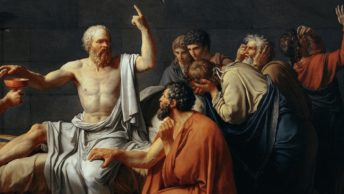
The designers of Common Core claim that critical thinking is an important part of the program. As someone who has been involved in the Critical Thinking Movement for well over forty years, I seriously doubt that claim for several reasons.
First, the authors of Common Core’s statement on critical thinking seem not to understand critical thinking. The statement says:
The Common Core asks students to read stories and literature, as well as more complex texts that provide facts and background knowledge in areas such as science and social studies. Students will be challenged and asked questions that push them to refer back to what they’ve read. This stresses critical-thinking, problem-solving, and analytical skills that are required for success in college, career, and life.
The idea expressed here—that students read text material, teachers ask them questions, and this approach teaches critical thinking—could not be more mistaken.
Genuine critical thinking involves students learning how to ask questions and find answers themselves. Skills are learned by practice, not by observation. This is true of jumping rope, riding a bike, dribbling a basketball, dancing, and driving a car. It is no less true of thinking.
Am I assigning too much significance to the Common Core wording? Not really. That wording reflects the historic misunderstanding that thinking is taught by osmosis—having students sit passively and absorb information. Teachers who harbor that view may sincerely believe that this approach teaches students to think, but they are merely engaging in mind stuffing by a more fashionable name. Telling students what to think never teaches them how to think.
A second reason I doubt Common Core’s claim is that few, if any, teacher training programs do an adequate job of preparing would-be teachers to teach critical thinking. Even if they “cover” critical thinking, they tend to regard it simply as a variety of subject matter to be presented to students. It is much more than that—specifically, a methodology in which the teacher is less a source of knowledge and more a guide. Unless teachers understand that methodology and develop skill in employing it, they are not able to teach critical thinking, no matter how sincere their intentions.
Education students could, of course, learn how to develop the special understanding and skill to teach critical thinking effectively after they graduate and begin teaching. But in today’s educational climate, there is little incentive to do so. Teachers’ unions have ensured that the pay scale and tenure standards are the same for all teachers, regardless of their abilities and performance. Besides, administrators are largely ignorant of the special challenge of teaching critical thinking and therefore unsupportive of those who accept that challenge.
Yet another reason I doubt Common Core’s claim to teach critical thinking is that Political Correctness often hinders the activity essential to critical thinking—asking probing questions about what is read or said in the classroom. For example:
Let’s say the textbook chapter states, “No reasonable person would deny that global warming is a real and immediate danger to the planet.” As the class is discussing the chapter, a student raises her hand and says, “I’m not sure that sentence is accurate. I read an article that argued against it.” The teacher’s reaction should be, “Hooray, here’s a student who has taken the first step in thinking critically—wondering.” He should then ask the student to elaborate and encourage the class to join the discussion.
Or let’s say another chapter states, “The struggle of the gay community to make gay marriage legal closely paralleled African-Americans’ struggle for emancipation.” A student says she disagrees with that comparison. Here, too, the teacher should seize the opportunity to discuss the issue, invite all the students to state their views and the evidence that supports them, and then decide which position is most reasonable.
However, many teachers will not respond as they should. Some will take over the discussion and assert their personal views because have never been taught to consider ideas that disagree with their own. Others will suspend discussion because Political Correctness has persuaded them that controversy should always be avoided. Both responses stifle rather than encourage critical thinking.
By its very nature, critical thinking involves dealing with controversy—that is, examining issues about which people hold differing views. It also requires us to make judgments; in other words, to follow the evidence to the correct conclusion, embrace it, and reject competing conclusions. Unfortunately, Political Correctness considers judgment offensive because it has the potential to hurt someone’s feelings.
A number of commentators, including Glenn Beck (in his book Conform) have called attention to other troubling features of Common Core. Their concerns deserve careful consideration. But what is already clear to me is that until those in charge of Common Core understand critical thinking, ensure that teachers have the requisite skill to teach it, and prevent Political Correctness from undermining it, their claims about making students critical thinkers should be discounted.
Copyright © 2014 by Vincent Ryan Ruggiero. All rights reserved
To see more of this author’s work, visit www.mind-at-work.com








